Um, Can We Go Back to Class Now?
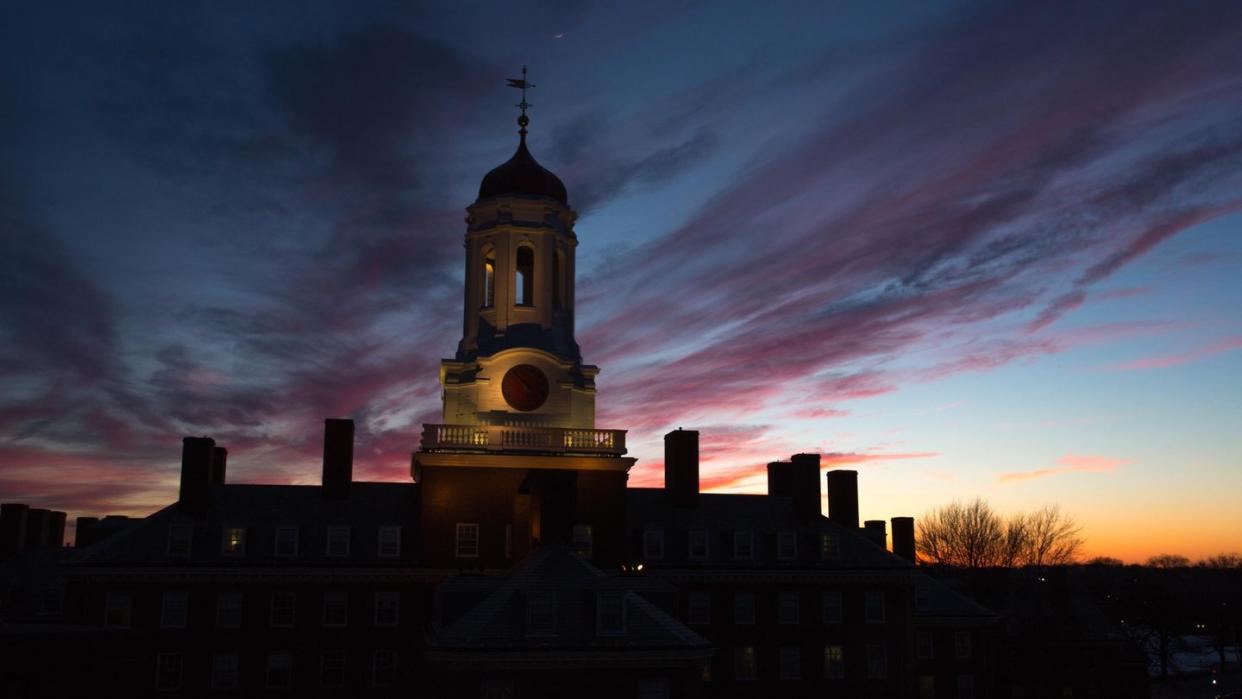
The trouble on American campuses started soon after the attacks on Israel on October 7. At a library at Cooper Union in New York, pro-Palestinian protesters were briefly recorded on video banging on a glass wall while students inside, including some Jewish counterprotesters, watched nervously. At Harvard and Columbia, a “doxxing truck” drove around the campuses displaying the faces and names of students who had signed an anti-Israel letter. An Israeli student was beaten outside the library at Columbia. Three college students of Palestinian descent were shot and injured in Vermont over Thanksgiving weekend.
The violence that was set off when Hamas attacked Israel and Israel responded by invading Gaza has put U.S. colleges and universities in the crosshairs of a kind of political controversy that hasn’t been seen on campuses in decades. The tempest has inflamed long-argued culture war positions. Conservatives are trumpeting that colleges, particularly elite ones, have gone even more “woke,” with one Wall Street Journal op-ed claiming that “academia has become a cancer metastasizing through its vital organs. The radical left is the cause.” Meanwhile liberals are calling out the right for using the conflict to advance their own agenda: Florida governor Ron DeSantis ordered Florida state colleges and universities to ban a pro-Palestinian student group.
Things reached a head in December, when the presidents of Harvard, the University of Pennsylvania, and MIT were called before a Congressional committee to respond to what Republican representative Virginia Foxx of North Carolina, the panel chair, called “rabid antisemitism.” Their testimonies proved so controversial that Elizabeth Magill of Penn soon resigned. Claudine Gay of Harvard barely escaped a vote of no confidence from the university’s board of directors but ended up resigning a few weeks later.
As students conduct marches and sit-ins, parents are watching the drama unfold with fear and confusion. Many Jewish and pro-Israel families with kids on campuses where pro-Palestinian activism has been vehement worry for their children. “I don’t feel like she’s in danger, but I do feel like she’s uncomfortable on campus, which I don’t like,” says one father who has a daughter at Columbia. “I think she’s uncomfortable expressing her opinions.”
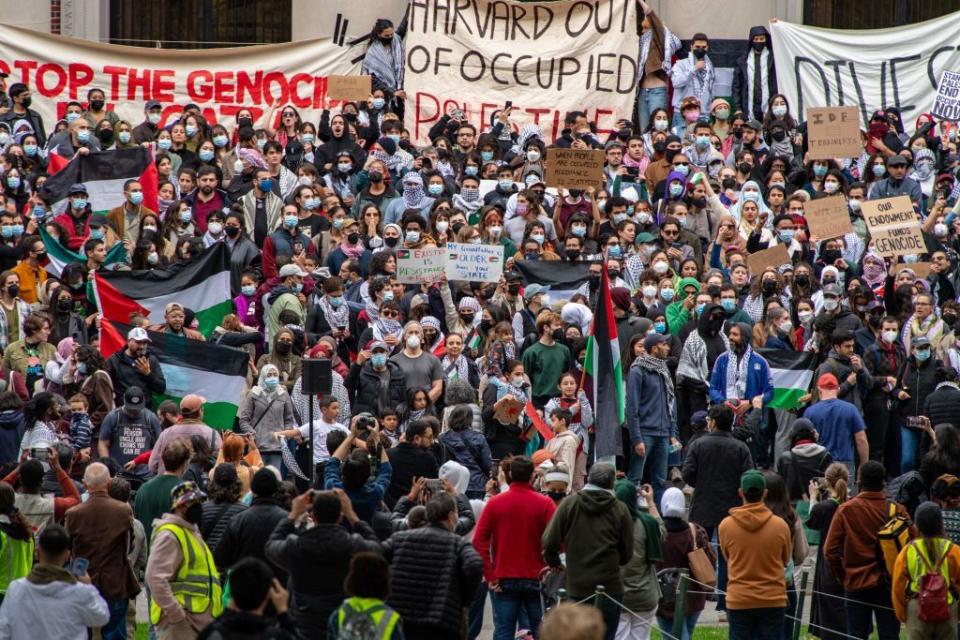
Parents of Arab students are also distressed. One mother who has a Palestinian-American daughter at USC says that her daughter “does not feel safe at all.” After her daughter posted something online supporting Palestinian children, she “got threats.” Her daughter was also yelled at for wearing a keffiyeh, which caused her mother to tell her to stop wearing it “or anything that makes her a target.”
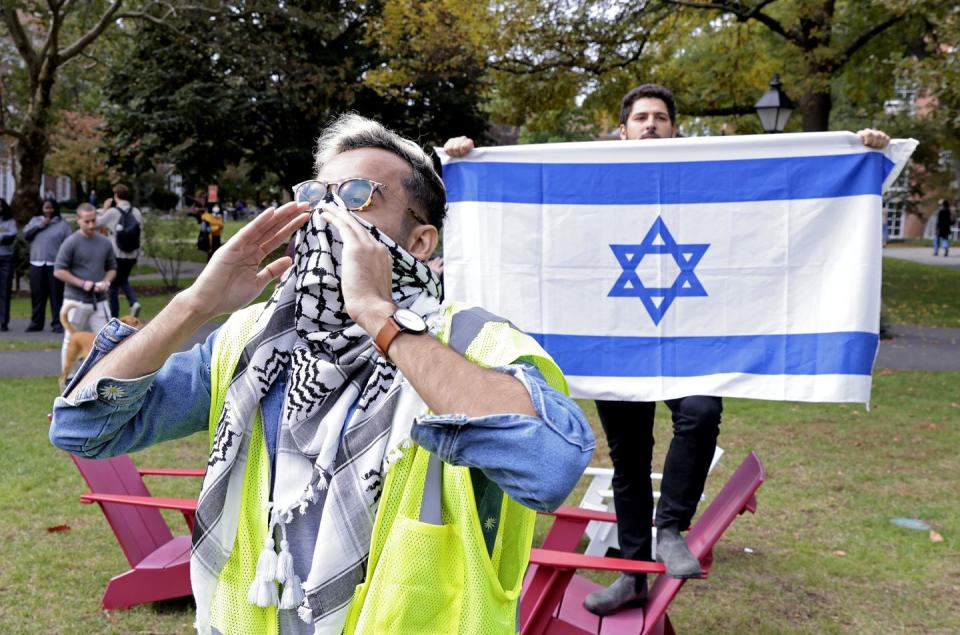
The father of the Columbia student is an alumnus of the university, and he says the situation has soured his opinion of his alma mater. “I look at it now as a place that would not welcome me,” he says. Still, he says he would never consider asking his daughter to leave or transfer. “The unfortunate thing is that so much of the outcome of your life is determined by where you went to college, and [the school] hasn’t lost that. It hasn’t lost its prestige.” A Manhattan mother echoes this. “Ambitious parents,” she says, “are absolutely not letting world events taint their desire for a top-ranked school.”
There have also been unexpected complications, such as students from pro-Israel families whose children have shifted their views after being at progressive schools and are now supportive not just of Palestine but Hamas. Their parents are “flabbergasted,” the Columbia dad says. “They’re like, ‘What the hell?’ It’s like the kid has been taken by a cult.”
While the Ivy League has become the poster child for aggravated activism and fuming donors, the atmosphere has been less charged at other elite institutions. At Stanford, although there have been a number of incidents that are being investigated as hate crimes (a mezuzah was removed from the door of a Jewish student’s residence, and a group of students who identified themselves as “Arab, Muslim, and/or Palestinian” said they were shoved by another student when attempting to post signs on campus), students on the whole are more muted, according to one parent. “Everybody at Stanford wants to have a startup and get funded. It’s very pre-professional. I think whatever they feel, they’re more cautious about expressing it publicly, knowing it can haunt them. If you want Blackstone to finance your company, you’re not going to make (Blackstone Group CEO) Stephen Schwarzman mad.”
Amy Binder, a professor of sociology at Johns Hopkins University, says that Hopkins has been similarly low-key and that it’s generally “not a politically charged place.” (That said, a doctor and faculty member at Johns Hopkins Medical School was placed on leave after allegedly posting “disturbing” remarks about Palestinians on X.) “A lot of our students are STEM here, a lot of them are premed, and I think a lot of those students keep their heads down. So this has not been a hotbed of political activity.”
Binder, who co-authored the book The Channels of Student Activism: How the Left and Right Are Winning (and Losing) in Campus Politics Today, says that in many ways “the stage was set” for the conflagration on campuses even before October 7. Students on the left, she says, have been leaning more left in recent years, creating stronger alliances with identity groups than with legacy organizations like College Democrats, while students on the right have been engaged in a “headlong lurch into being very proactive and very confrontational and not letting any crisis go to waste. And then there’s a history of universities putting out statements about political events and currying disfavor among folks on campus and among alumni and donors. There were flashpoints already in place about divestment from Israel and Palestinian rights, so that got activated. All of this has created this situation.”
As higher education officials grapple with how to walk this tightrope, some schools, including the ones featured here, are proving that a nuanced and thoughtful approach is, in fact, possible, and not just because students are too busy trying to polish their résumés or prep for the MCAT. On these campuses a combination of school administrators, faculty members, and students have come up with ways to coexist and maintain what parents and students alike expect from a college: a welcoming campus environment dedicated, above all, to learning and preparing kids for success.
Some of these schools are committed in the name of academic independence to staying neutral about political and social issues, and so far they have made it work. Others are fostering civil discourse on campus by engaging all sides, creating opportunities for discussion, and setting guidelines for acceptable behavior. And then there are the schools that encourage unity by focusing on providing traditional college experiences.
Vanderbilt University
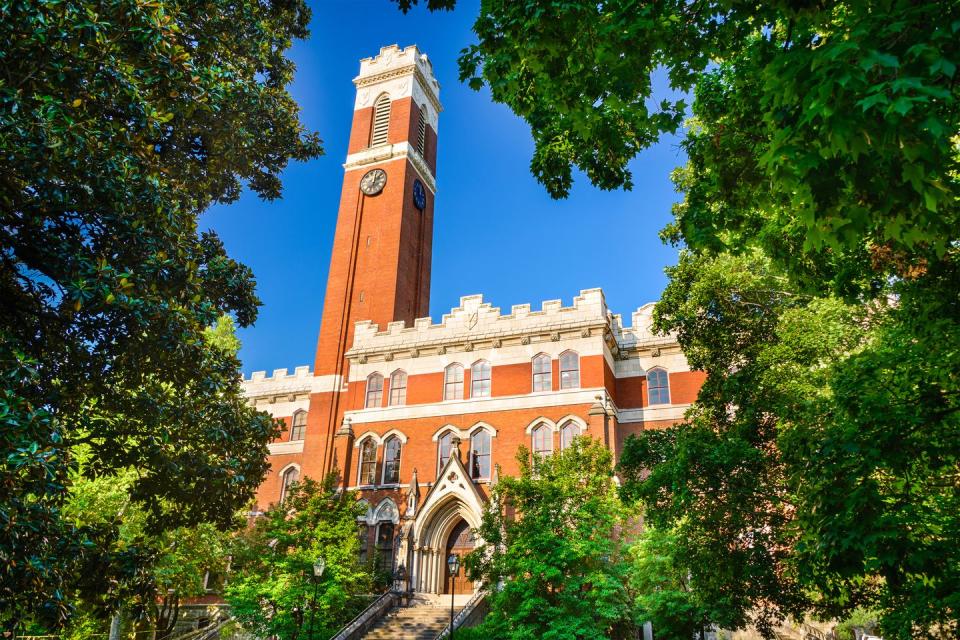
Under chancellor Daniel Diermeier, Vanderbilt has taken a strong stance on what Diermeier calls “principled neutrality” in the face of political events. This position has drawn criticism from some faculty members and alums—and caused Diermeier to come out with a stronger statement to the Vanderbilt community in the wake of the initial attacks—but it has also kept things relatively calm on campus. In the days after the October attack, Vanderbilt faculty members organized forums for students to discuss the events, and 200 students from the school’s Hillel and Chabad held a vigil for lives lost in the attacks on Israel. Those who gathered arranged small candles in the shape of the Star of David on the lawn in front of the campus library, and an Israeli flag was hung on a bronze statue of Harold Stirling Vanderbilt.
In the following weeks pro-Israel students staged a walkout of classes, and students in support of Palestine organized demonstrations and created an art exhibit on a campus lawn—featuring sculptures of body bags smeared with red paint to resemble blood—memorializing the lives lost in Gaza. But in the name of free speech, the university has avoided violent conflict. Diermeier credits this to the fact that the university historically has not taken public stands on issues—such as gun control or abortion rights—but instead focuses on protecting members of its community. Freshmen also sign a “community covenant” akin to an honor code “about civil discourse and a willingness to listen,” Diermeier says. “Signing it is a commitment to those values as a member of the Vanderbilt community.”
University of Chicago

In 1967 the University of Chicago appointed a committee to prepare “a statement on the university’s role in political and social action.” Its conclusion, spelled out in the now famous Kalven Report, was that, in the interest of academic freedom, the school should remain neutral. “A university, if it is to be true to its faith in intellectual inquiry, must embrace, be hospitable to, and encourage the widest diversity of views within its own community.” In accordance with those guidelines, the university released a lean, measured response to the Middle East conflict in early October. This approach drew criticism from groups wanting a more vehement position, but it allowed the university to foster protests on both sides of the debate that, while tense and contentious, have not erupted into the types of violence seen on many other campuses.
On October 19 students from Jewish organizations gathered for a rally in support of Israel on the university’s quad, where Students for Justice in Palestine had been holding protests since October 16. Both sides chanted, waved flags, and tried to drown each other out with megaphones. At one point an altercation was broken up by campus police, but otherwise, according to the student newspaper the Chicago Maroon, “the two groups largely stuck to their respective sides of the quad.”
More protests followed in November, including calls for the university to divest from Israel and a sit-in by the student group -UChicago United for Palestine inside a campus building, which led to the arrests of students and two faculty members for criminal trespassing. Aside from some jeering at the campus police, however, the event was peaceful. And in general, the unrest at Chicago is minor. It isn’t interrupting daily life the way it is at the Ivies, where in some cases police teams are patrolling the campus and the mood is pervasively fraught.
Kent State University
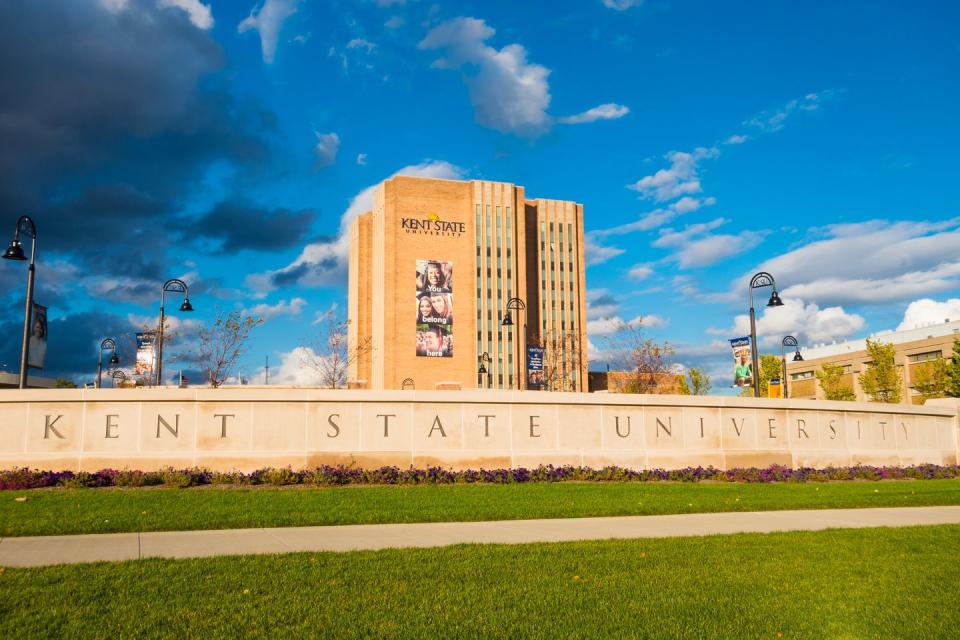
Kent State has a well-known history of political conflict: In 1970 the Ohio National Guard shot and killed four undergraduates protesting the Vietnam War. This tragedy led to the creation of an academic curriculum, through Kent State’s School of PEace & Conflict Studies, centered on constructive conflict management. This framework, and the fact that it’s baked into the school’s DNA, helped the university take a proactive, and inclusive, approach to the October attacks. Early that month a group of students in support of Palestine marched on campus with signs and shared the Palestinian perspective with a crowd of about 40 students. The group also painted a Palestinian flag on a giant rock on campus that is available to students to paint to support causes, promote events, and offer words of encouragement.

Later the same day Jewish students held a vigil near the university Hillel, singing the Israeli national anthem and Hebrew songs, sharing stories, poems, and prayers, and reading the names of the 1,200 people who had been killed in Israel at that point. It wasn’t kumbaya between the groups, but it wasn’t violent. (One Jewish student interviewed by KentWired.com took a 10--minute detour to class in order to avoid the pro--Palestinian rally.)
Then in mid-November the School of Peace & Conflict Studies organized a forum “to help students develop the tools for finding accurate, reputable, reliable media sources and for constructively engaging in discussions about the events unfolding each day in this conflict,” according to R. Neil Cooper, the school’s director.
“It was the most powerful demonstration of our core values,” says Eboni Pringle, interim senior vice president of student life at Kent State. “Students were in the room, focused on being able to demonstrate that they were able to express their views but still be open to hearing the views of others. And being able to demonstrate respect even if they didn’t agree.”
Dartmouth College
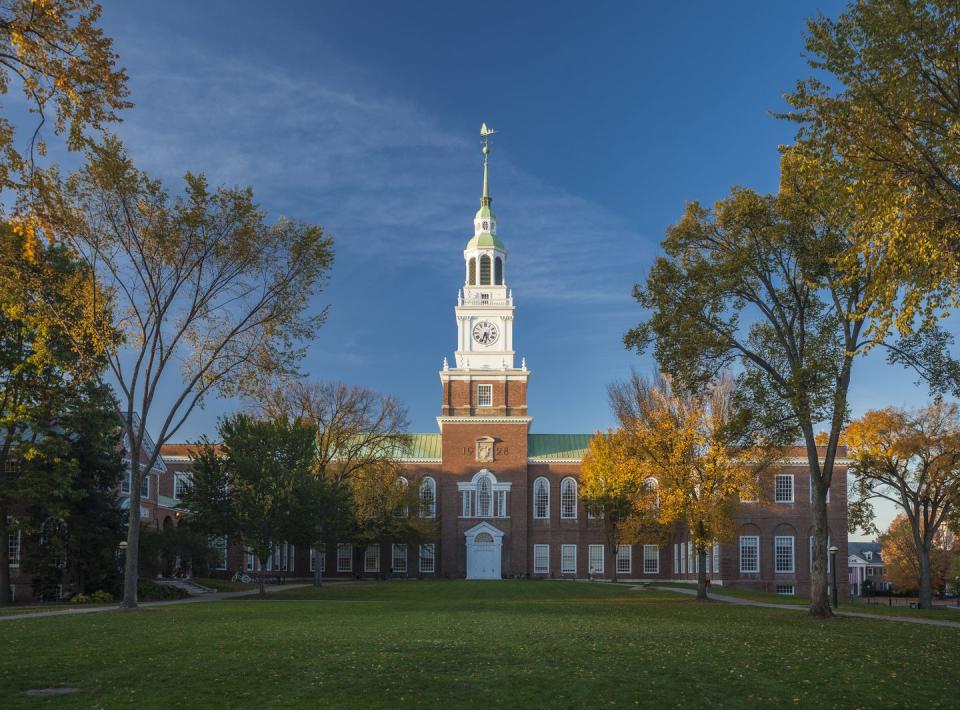
Hours after the news of the attacks in Israel reverberated around the world on October 7, Susannah -Heschel, chair of Jewish Studies at Dartmouth, was on the phone with the chair of Middle Eastern Studies, Tarek El-Ariss, who was in Cairo. The pair are close colleagues and often collaborate, co-sponsoring events and cross-listing their courses. This relationship was crucial, as the pair discussed how to address the crisis, deciding to hold a forum for faculty and students to discuss the issues as scholars in an attempt to understand all positions.
The professors expected two dozen people to show up to the event, which was organized for the following Tuesday and featured a cross-section of Egyptian, Israeli, and Middle Eastern scholars. In the end more than 70 students came, with another 600 tuning in via livestream. A second forum was later held in an auditorium that held 300, with 1,000 watching the livestream. Heschel says the vibe at the events wasn’t contentious, but she admits that “there were some expressions of emotion that were hard for me, I have to say.
“But I think what we did was model for the community of students and faculty an atmosphere of collegiality, of respect, of how to come together when something horrific happens. Terrible events can tear people apart. But they can also bring people together to be supportive, and that’s what we wanted… We kept the campus from polarizing.”
Dartmouth hasn’t been completely without strife. In late October two students from the progressive Sunrise Movement were arrested for criminal trespass after they camped outside the residence of Dartmouth’s president in protest of what they called the college’s support of “Israeli apartheid.”
Elon University
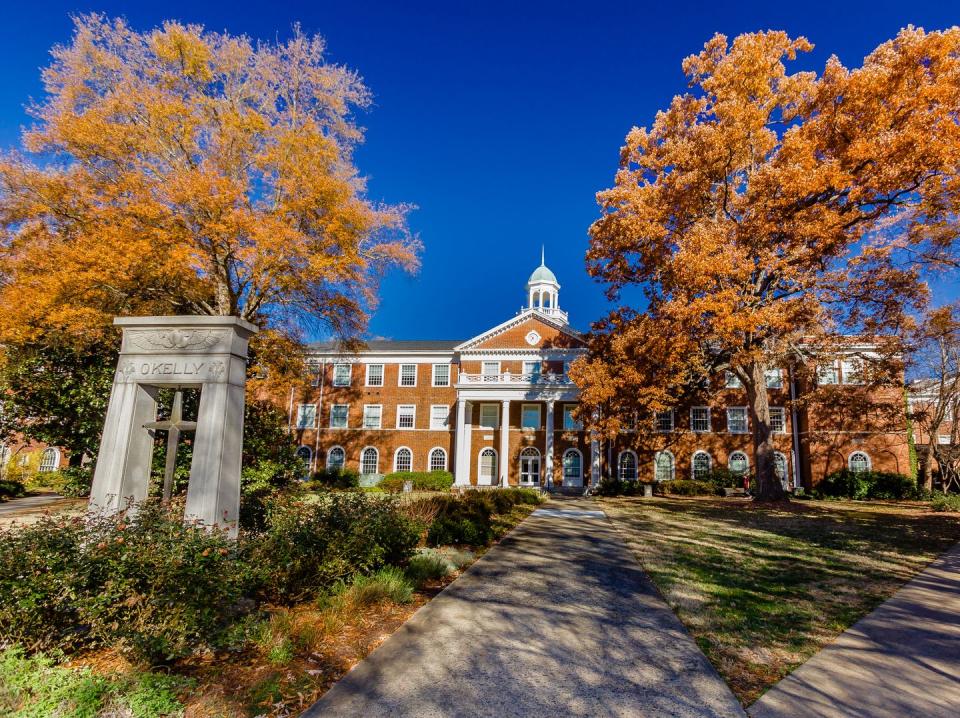
In 2014, in response to the unrest and rioting in Ferguson, Missouri, after Michael Brown, a Black teenager, was fatally shot by a white police officer, Elon University established a program whereby the school would set up rapid response panels to discuss timely and controversial issues in the news. “The idea is you would pull things together quickly and get the right people onstage and not tell students what to think, but give them a space to really hear and learn,” says Carrie Eaves, an associate professor of political science who is Elon’s faculty fellow for civic engagement.
That tradition has lived on through crises like the Derek Chauvin verdict, the attack on the U.S. Capitol, and now the conflict in the Middle East. At Elon, a progressive liberal arts school outside Greensboro, North Carolina, the faculty immediately began communicating about how to respond to the Israel-Hamas war over the weekend of October 7. Rather than having professors present from the stage, it was decided that something more interactive was necessary. The result was a series of roundtables, in a so-called “world café” format, in which small groups of students sat for mini-sessions with a faculty member from a particular field of relevant expertise—Middle Eastern Studies or Judaism or political science—and then rotated to the next table for another discussion. Eaves and her colleagues expected that maybe a dozen or two dozen students would show up to the workshops. In the end there were more than 200. “We were pulling out every additional chair we could find and cramming more chairs around tables as quickly as possible,” she says.
“I spoke to a lot of students afterward, and they really appreciated the ability to ask questions in a smaller, more intimate format. They were just sitting around tables talking to a faculty member—in some cases faculty members partnered up—and had a chance to ask questions in a sort of lower-stakes environment. Not grabbing a mic in front of 200 people to ask a question.”
Elon’s tolerant stance lends itself to less tension, but Eaves says the tone of the gathering was made clear at the outset, when students were told, “You’re not here to persuade anyone. You’re not here to advocate your view. Please approach this with a focus on listening and learning.”
University of Alabama
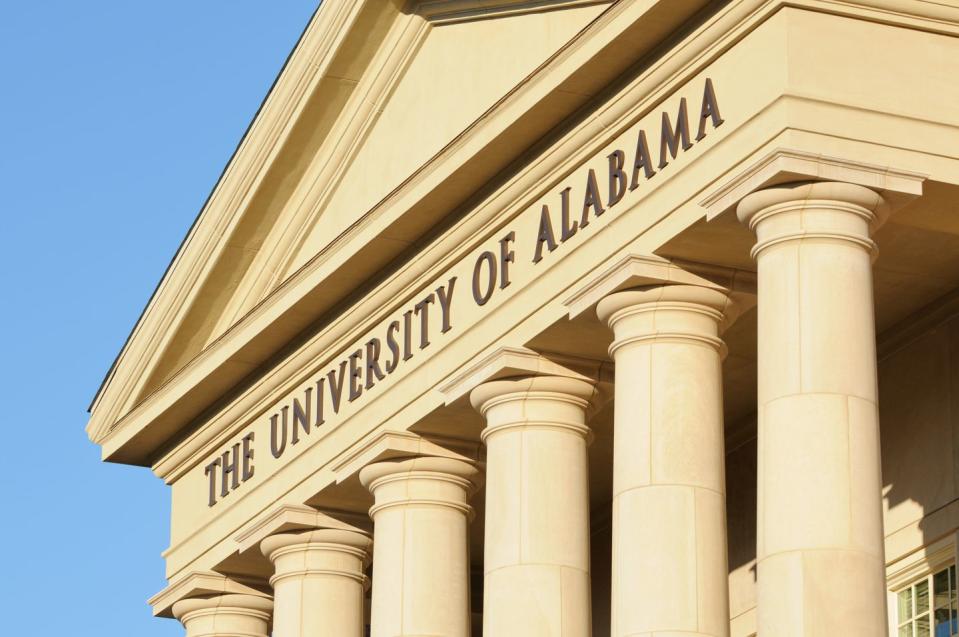
School spirit and a deep commitment to football have long defined this Southern state university, and both of those things remained true through the fall of 2023. In early December, as Ivy League presidents testified before Congress, the University of Alabama’s student newspaper, the Crimson White, was saturated with coverage of Bama’s SEC championship upset victory over the University of Georgia a few days earlier, as well as stories about the Republican primary debate that was going to be held on campus. “That’s kind of where the university’s head’s been at,” says Samantha Sigal, an Alabama undergrad who is an executive board member of the campus Chabad. University administrators have also been mum on the Middle East, refraining from putting out a statement.
In early October Sigal and fellow Chabad members held a prayer service for the lives lost in Israel in conjunction with the campus Hillel, and the Chabad rabbi set up tables on the quad asking Jewish students if they’d “like to wrap tefillins and say some prayers,” Sigal says. “Since then there really haven’t been any protests on campus. There was one group that held prayers for Israel, and there were counterprotests, I guess, but they weren’t really protests. There were pro-Palestine individuals that were walking around the student center holding up signs.”
Sigal says she’s grateful she isn’t experiencing “antisemitism or any hostility on campus,” but that the indifference of students can also be difficult. “For a lot of [Jewish students], we feel like we have to put a mask on every single day just to interact with those around us, because we don’t want to be walking around all upset and being the only ones talking about” the Middle East. “But at the same time, we do feel it’s important to educate and make people aware of what’s going on in the world. So it’s an interesting balance that we’re having to find daily.”
A version of this story appears in the February 2024 issue of Town & Country. SUBSCRIBE NOW
You Might Also Like